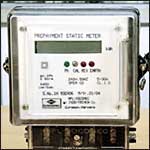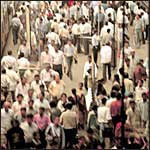 |
 |
| Stalemate: T.P.G. Nambiar
(left) and Rajeev Chandrasekhar |
For Rajeev Chandrasekhar, chairman
of BPL Communications, the directive from the Chennai bench of the
Company Law Board (CLB) couldn't have come at a worse time. Three
foreign telcos-including the UK's Vodafone and Russia's Sistema-are
doing due diligence at BPL Communications as a prelude to buying
a stake in it, but the bench has directed status quo in shareholding
until it hears the case in April. But, as Chandrasekhar knows, it's
hardly just a question of waiting for a month or so. His ongoing
feud with his father-in-law and BPL founder, T.P.G. Nambiar, will
certainly spill over from the CLB to one court to another. That
makes Chandrasekhar's plans of roping in a strategic investor in
the telco, which has licences to offer services in Mumbai and three
southern states (Kerala, Tamil Nadu and Pondicherry), that much
uncertain. This, at a time when the government has allowed 74 per
cent foreign ownership in telcos. A BPL Communications official,
however, claims that "(the company) will go ahead with our
due diligence since the deal is slated to happen only in September".
For TPG too, time is fast running out, since he needs to bring in
some Rs 90-125 crore to salvage the JV his son Ajit, the CMD of
the ailing consumer electronics company BPL Ltd., has signed with
Sanyo.
-Sahad P.V.
CURIOSITY
Pre-Paid Meters
 Parts
of Mumbai already have it; now it is Delhi's turn to get pre-paid
electricity. Manufactured by Havell's Private Limited, the pre-paid
electronic meter works just like the pre-paid card in mobile phones.
The consumer is alerted when the charge value drops, and replenishment
coupons can be bought off-the-shelf at the utility. The advantages:
Zero theft and tampering for the utility company, and convenience
for the user (no misuse of power while you are on vacation). There
aren't too many takers yet, but North Delhi Power Ltd. (NDPL) plans
to offer 3,000 such meters in Delhi's Civil Lines, Rohini and Pitampura
neighbourhoods. Parts
of Mumbai already have it; now it is Delhi's turn to get pre-paid
electricity. Manufactured by Havell's Private Limited, the pre-paid
electronic meter works just like the pre-paid card in mobile phones.
The consumer is alerted when the charge value drops, and replenishment
coupons can be bought off-the-shelf at the utility. The advantages:
Zero theft and tampering for the utility company, and convenience
for the user (no misuse of power while you are on vacation). There
aren't too many takers yet, but North Delhi Power Ltd. (NDPL) plans
to offer 3,000 such meters in Delhi's Civil Lines, Rohini and Pitampura
neighbourhoods.
-Amanpreet Singh
STATS
Jobs Update
 |
| Jobs? It's a cinch |
Ma Foi's employment survey, covering
2,046 companies, for January-March 2005 reveals some interesting
trends. Temping is growing, with an 11.4-per cent increase projected
during the quarter. Chennai's job market is growing the fastest
followed by Hyderabad, Bangalore, Delhi and Mumbai. Private limited
companies are to hire more than public limited firms, and women
constitute about 17 per cent of the workforce, with healthcare and
ITEs emerging as the top two employers for them.
-Roshni Jayakar
The BT 50 Index
India's first free-float index, BT 50, is holding
steady before the Budget.
One of the advantages of a free-float
index is that it is far more responsive than other indices. True
enough, BT 50 Index, India's first index based on free float has
been just that since the time it was launched, although it is right
now in some sort of steady state.
In early 2003, BT decided to launch its own stock-market index
because of issues it had with the construct of India's two most
commonly used indices, BSE's Sensex, and NSE's Nifty. Both were
based on market capitalisation; that is, the weightage allotted
to a certain company in the index is based on its market capitalisation.
The problem: the inclusion of closely-held companies with large
market capitalisation distorts the index. Corollary: the total exclusion
of such companies will render the index unrepresentative. (The Sensex
went free float after BT launched its index).
BT decided to adopt the free-float method, wherein the market
capitalisation of a company is based on the quantum of shares available
in the market for trading. Ergo, this method excludes the holding
of promoters and strategic investors. However, while companies are
required to furnish their shareholding pattern to the exchanges,
the current format of disclosure isn't very strong-some companies
have reported a free float of 100 per cent, while it is common knowledge
that a major portion of the equity of these companies is held by
a few strategic investors. BT discounted these strategic holdings.
Free float didn't just help us choose the companies that should
constitute the index; it helped us allot them weightages. To complete
the methodology: the free float is according to data as on December
31, 2002; the index begins in January 2002, and its base value,
like other indices is 100. All weights are updated every quarter,
based on shareholding patterns. Keep tracking!
-Narendra Nathan
|






 Parts
of Mumbai already have it; now it is Delhi's turn to get pre-paid
electricity. Manufactured by Havell's Private Limited, the pre-paid
electronic meter works just like the pre-paid card in mobile phones.
The consumer is alerted when the charge value drops, and replenishment
coupons can be bought off-the-shelf at the utility. The advantages:
Zero theft and tampering for the utility company, and convenience
for the user (no misuse of power while you are on vacation). There
aren't too many takers yet, but North Delhi Power Ltd. (NDPL) plans
to offer 3,000 such meters in Delhi's Civil Lines, Rohini and Pitampura
neighbourhoods.
Parts
of Mumbai already have it; now it is Delhi's turn to get pre-paid
electricity. Manufactured by Havell's Private Limited, the pre-paid
electronic meter works just like the pre-paid card in mobile phones.
The consumer is alerted when the charge value drops, and replenishment
coupons can be bought off-the-shelf at the utility. The advantages:
Zero theft and tampering for the utility company, and convenience
for the user (no misuse of power while you are on vacation). There
aren't too many takers yet, but North Delhi Power Ltd. (NDPL) plans
to offer 3,000 such meters in Delhi's Civil Lines, Rohini and Pitampura
neighbourhoods.